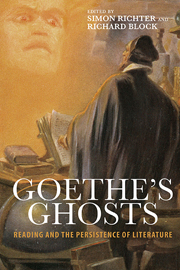Book contents
- Frontmatter
- Contents
- Introduction—Ghosts and the Machine: Reading with Jane Brown
- Part I The Ghosts of Goethe's Past
- 1 Egologies: Goethe, Entoptics, and the Instruments of Writing Life
- 2 Goethe's Haunted Architectural Idea
- 3 “Über allen Gipfeln”: The Poem as Hieroglyph
- 4 Goethe's Hauskapelle and Sacred Choral Music
- 5 From Haunting Visions to Revealing (Self-)Reflections: The Goethean Hero between Subject and Object
- Part II The Ghost That Keeps on Giving
- Part III Spirited Encounters
- Bibliography of Jane K. Brown's Publications
- Notes on the Contributors
- Index
5 - From Haunting Visions to Revealing (Self-)Reflections: The Goethean Hero between Subject and Object
from Part I - The Ghosts of Goethe's Past
Published online by Cambridge University Press: 05 March 2014
- Frontmatter
- Contents
- Introduction—Ghosts and the Machine: Reading with Jane Brown
- Part I The Ghosts of Goethe's Past
- 1 Egologies: Goethe, Entoptics, and the Instruments of Writing Life
- 2 Goethe's Haunted Architectural Idea
- 3 “Über allen Gipfeln”: The Poem as Hieroglyph
- 4 Goethe's Hauskapelle and Sacred Choral Music
- 5 From Haunting Visions to Revealing (Self-)Reflections: The Goethean Hero between Subject and Object
- Part II The Ghost That Keeps on Giving
- Part III Spirited Encounters
- Bibliography of Jane K. Brown's Publications
- Notes on the Contributors
- Index
Summary
Wo Objekt und Subjekt sich berühren, da ist Leben.
[Where object and subject meet, there is life.]
—Goethe to Gustav Parthey, 28 August 1827At the very beginning of the drama, a desperate and daring Faust conjures up the Earth Spirit, but he recoils under the impact of his haunting vision: “Schreckliches Gesicht! […] Weh! ich ertrag dich nicht” (Appalling vision! Woe, I cannot bear your sight). Ironized as an “Übermensch” (superman) and derided as “Ein furchtsam weggekrümmter Wurm” (A fear-filled cringing worm), Faust is dismissed by the vanishing spirit with the verdict: “Du gleichst dem Geist, den du begreifst, / Nicht mir!” (490, 498, 512–13; You resemble the spirit that you comprehend / Not me). As Faust realizes, subjective yearnings and visions, however powerful, do not suffice to grasp or to hold on to the desired object:
Hab' ich die Kraft dich anzuziehn besessen, So hatt' ich dich zu halten keine Kraft.
(624-25)[Having possessed the strength to summon you, I had no strength to make you stay.]
The relationship between subject and object has changed completely, reflecting the protagonist's transformed capabilities, when we learn about the results of Faust's subsequent encounters with the Earth Spirit. An amazing expansion and reversal has occurred that is also reflected by the environment in which the protagonist finds himself.
- Type
- Chapter
- Information
- Goethe's GhostsReading and the Persistence of Literature, pp. 97 - 108Publisher: Boydell & BrewerPrint publication year: 2013



